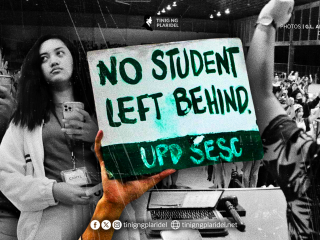Student journalists and former staffers of An Lantawan, the campus publication of Leyte Normal University (LNU), condemned their school administration over its “repressive” policies and intervention with the publication’s editorial operations.
According to Troy Ortega, the former managing editor of An Lantawan, the publication was asked to undergo the university’s accreditation process in August, even if the LNU Student Manual only requires it among student organizations.
This is the first time that An Lantawan has been asked for accreditation since its establishment in the 1970s.
“In August, nagpo-post kasi kami ng news content without an adviser. I think that was the moment that the university flag this. Ayaw nilang nagpo-post kami without an adviser and accreditation status,” Ortega said in an online interview with Tinig ng Plaridel.
Although the staffers continuously asserted the publication’s right to autonomy, Vice President for Student Development (VPSD) Generoso Mazo responded that the accreditation would “formalize and officialize” their operations.
Further, Ortega said the LNU admin also selected an adviser for An Lantawan before the staffers could even send their recommendations.
Section 6 of the Campus Journalism Act of 1991 states that a publication adviser shall only be chosen from the suggestions of its staffers.
“We searched around the university but no one accepted the challenge of being an adviser, so we asked the VPSD . . . what are their suggestions . . . It turns out that may na-select na palang Student Publication Adviser (SPA).” Ortega explained.
In line with the accreditation process, Mazo also instructed staffers of An Lantawan to craft interim guidelines that would formalize the “evaluation and appointment” of their new members and “officers.”
For aspiring members of the editorial board, LNU officials mandated applicants to submit a portfolio of their previous outputs, on top of an exam and interview, to be evaluated by the publication adviser, Director for Student Activities and Organizations and the VPSD.
Moreover, the VPSD reportedly told the staffers that he would send the interim guidelines to the Office of the Solicitor General (OSG) to ask for “legal advice” on the matter.
“After that, nakareceive na lang kami bigla ng message containing only a screenshot ng table of suggestions na pinadala ng VPSD sa aming adviser emphasizing the annual accreditation,” Ortega added.
The staffers tried requesting the full document, but their adviser only had a copy of the screenshot from the VPSD.
It was then revealed to them by a Rappler report that Solicitor-General Menardo Guevarra denied receiving any document from LNU regarding the interim guidelines.
“I am hoping there will be an administrative action on this because we’re talking about VPSD lying to us and the bureaucratic processes given to us, hindering us from operating for more than two months,” Ortega said.
Without accreditation, the publication was also barred from using the An Lantawan name and logo in any post or document. They were instead instructed by the VPSD to rebrand their Facebook page to “LNU – Student Publication Office.”
“Gusto nila kaming tawagin as student documentation team instead of referring to us as An Lantawan staffers,” Ortega said.
In a statement released by An Lantawan Alumni, former members of the publication affirmed that this is not the first time they were put under “increased scrutiny.”
Last July, a candidate for a position in the student council filed a cyber libel complaint against the publication’s former editor-in-chief Gio Costuna. Although the case was junked, Costuna and the other editors were still removed from their positions by the LNU admin on July 28.
Further, the university administration previously asked the publication to refrain from posting opinion articles that were critical of the government, saying it “puts the university in [a] bad light.”
“With this and the demand for accreditation, the intention of the university to censor An Lantawan by hiding behind technicalities and bureaucratic procedures is loud and clear,” the statement of An Lantawan Alumni reads.
‘Respect autonomy, independence’
The College Editors Guild of the Philippines (CEGP), an alliance of student publications in the country, urged on Oct. 24 the Commission on Higher Education (CHED) to investigate the alleged repressive policies of LNU.
The following day, CHED Eastern Visayas Regional Director Maximo Aljibe responded and said their office had already contacted the LNU administration.
“[The Commission] also emphasizes the need for the institutions to maintain a balance between academic autonomy and adherence to the provisions of Republic Act 7079 which upholds and protects the freedom of the press even at the campus level,” the CHED regional office’s statement reads.
Meanwhile, Mazo denied allegations that the university was curtailing press freedom through an advisory posted on Wednesday, Oct. 25.
He argued that the accreditation process for student organizations and publications “is a standard procedure in many educational institutions worldwide.”
In a now-taken down post, An Lantawan issued an official statement on Oct. 30 responding and calling for the LNU administration to uphold the editorial independence of the publication.
“We firmly assert that we must have the freedom to create and revise our own editorial policies, report stories, express critical and scrutinize campus events without the looming threat of external influences,” the publication said in the deleted statement.
The Facebook page of An Lantawan was briefly suspended on Oct. 31, on the grounds of “impersonation.” The student journalists suspected that it may have been brought down by a series of “mass reporting attacks.”









